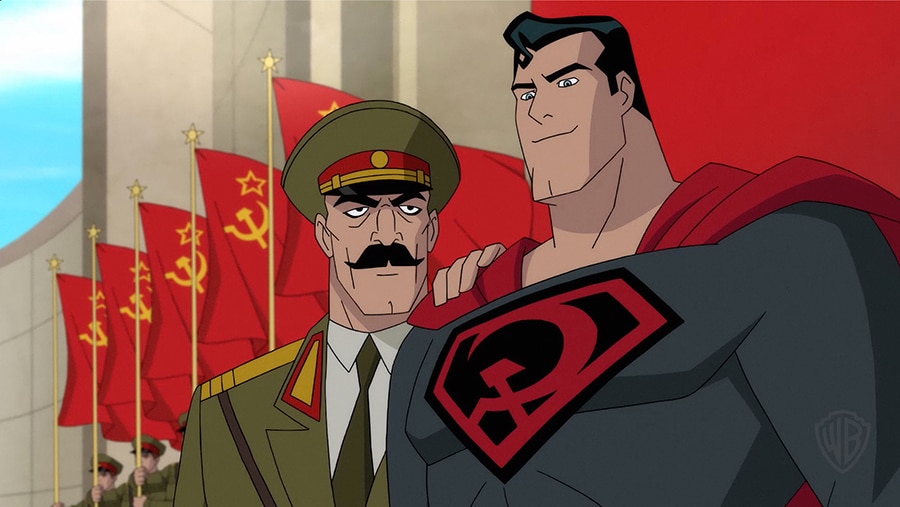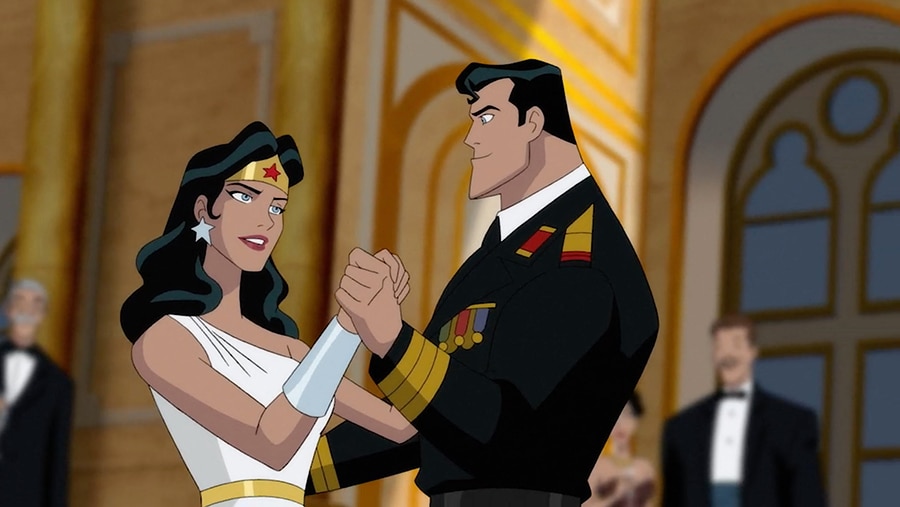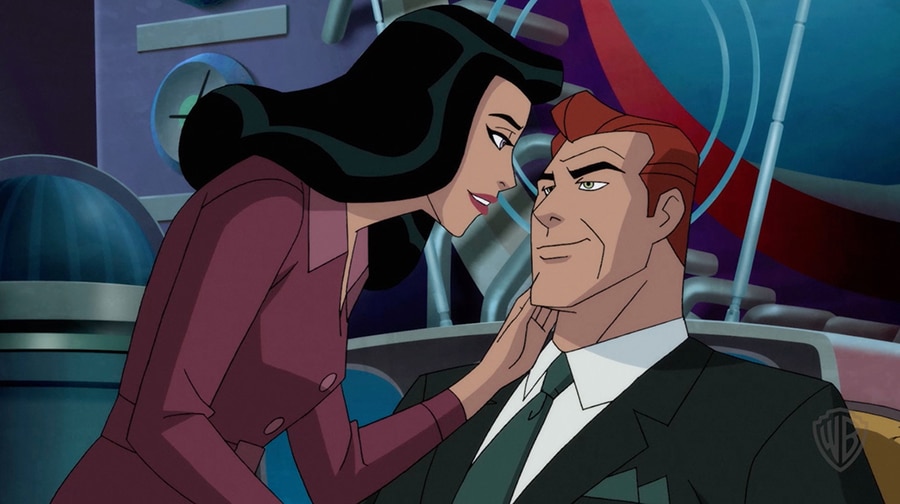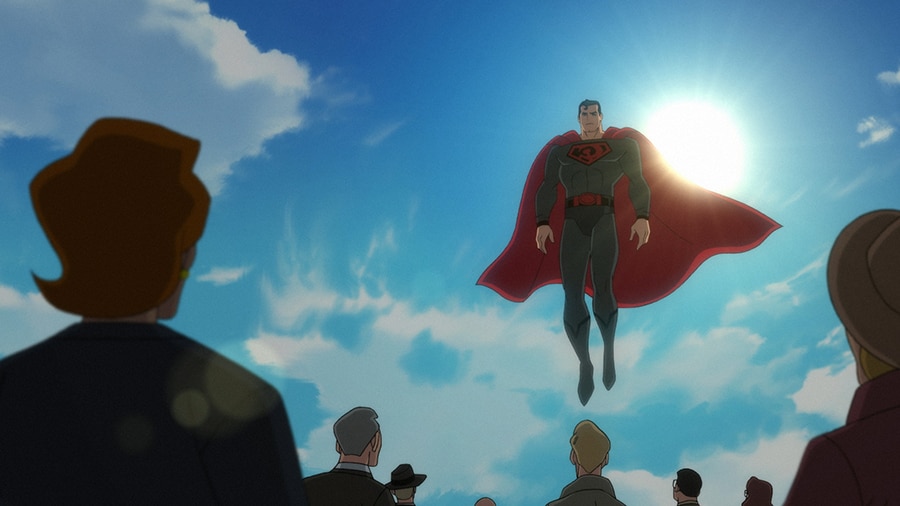If you ever wrote off geography as unimportant, then Superman: Red Son might change your mind. The latest DC animated movie, based on Mark Millar’s critically acclaimed Elseworlds story, explores how different the world would be if Superman had landed in Soviet Russia instead of Smallville, Kansas. The animated movie puts a new spin on some of your favorite DC characters and explores themes of morality, nationalism and violence. We recently had a chance to chat with director Sam Liu, voice actor Diedrich Bader (Lex Luthor) and voice actress Vanessa Marshall (Wonder Woman), and they gave us some incredible insight on the movie.
Warning, there are spoilers ahead!
One of the most interesting aspects of the movie is that we’re dealing with a Superman who feels more like a villain than a hero at times. Although he closes down Russia’s gulags, the Man of Steel’s regime is just as authoritarian as Stalin’s.

“He’s doing things in a less egregious kind of way,” director Sam Liu tells us. “He’s not putting his people in gulags or killing them. He’s trying to do the right thing. He thinks it’s better than how it was.”
Trying to find the right moral balance without making Superman irredeemable was a challenge for the film, as Liu explained. “The line was difficult, but we were trying to make him understandable, and show the weight of his decisions.”
Wonder Woman, who’s brilliantly voiced by actress Vanessa Marshall, attempts to serve as a moral compass for Superman, but finds herself getting drawn into a violent conflict.
“The Wonder Woman character is someone who is trying to decide what side she wants to be on,” Liu says. “What she ultimately wants is peace.”

“I think it's the Wonder Woman that we all know and love for the most part,” says Marshall, while acknowledging some key differences. “A few details are perhaps more unique, but I think in this tale, she's considered an equal by Superman and she has a unique ability to influence and work with him to help him achieve his benevolent vision. Because she's unaffiliated with either USA or Russia, she's certainly strong enough to go toe-to-toe with any superhero, but she's also quite an independent thinker.”
Liu and Marshall spoke about Wonder Woman’s decision to remove herself from the conflict, and have the Amazons abandon Man’s World.
“She very much implores that they cease fighting, and when she breaks the lasso of truth, her bond is broken with Superman,” Marshall shares. “And given that they don't heed her request to stop fighting, I think that's the only course of action she's left to take.”
“She had hope that Superman would bring peace, but the longer she stayed and the more she witnessed, it was clear that men always choose violence—or the leaders of these people, which happen to be men,” Liu added.
On the subject of moral compasses, Diedrich Bader spoke about the influence the women of the story had on the men.

“Just as Wonder Woman is the moral arbiter for Superman, Lois is the moral arbiter for Lex,” he says. “She always gives him perspective. She is willing to point out when he's wrong where everyone else is a little bit intimidated or afraid of him. Lois and Lex's marriage goes from being irritating and kind of shallow to growing to be a much deeper one.”
That evolution was something of a surprise, and Bader revealed that some lines were re-recorded when it became clear that Lex was going down a more redemptive path. “That monologue at the end was brilliantly written by Bruce Timm,” he reveals. “It really informed the rest of it. We went back and re-recorded stuff once we had nailed where Lex was going. The overall arc led to that. It is a moral journey. He comes from destroying Superman in a very amoral way, to realizing the preciousness of life and discovering his soul. It's very beautiful.”
In fact, Bader isn’t sure if this version of Luthor can be considered a villain. “What's interesting about Lex in this context is that he's actually not a bad guy,” he says. “He does what he can to defend the country and defend the world from what he thinks is an extraterrestrial aggressor.”
Liu agrees that the villain of the story isn’t Lex Luthor. “It would have to be Brainiac,” he suggests. “I think Luthor and Superman start from different places, but they have the same goals. They’re like two opposing sides on the chessboard. Their goal is to win for different reasons.”
Bader adds, “It's a morally complex tale. That's what's so fascinating about it. Usually, we know who the good guys and bad guys are, but in the real world it's much more complex than that. Everybody has their own interests, and their own perspective. This is a journey in animation into the moral complexity of real life. It's kind of fascinating, I was really blown away when I saw it.”

At its heart, Superman: Red Son is an alt-history tale that happens to involve some of the world’s most famous superheroes and villains. That’s a conceit that Liu in particular seemed to relish.
“I’ve always enjoyed stories that are grounded in real history, like Watchmen or The New Frontier,” he shares. “This story covers two different cultural styles, Soviet Russia and the United States. We went through different architectural styles across different eras.”
In the end, a different world meant a different ending for Luthor and Superman.
“They’re both changed by all this,” Liu concludes. “Lex was sort of influenced by Superman's sacrifice at the end. It leads Lex to a little bit more of a peaceful kind of way. Superman, instead of leading, decides to blend into the background and just observe. Luthor sees what Superman has done and he chooses to let go a little bit as well. We wanted to end on a hopeful ending, instead of one where someone is definitively the villain, someone is the winner, and there is a loser.”
Superman: Red Son is now available on 4K Ultra HD Blu-ray Combo Pack, Blu-ray Combo Pack and Digital HD.




















